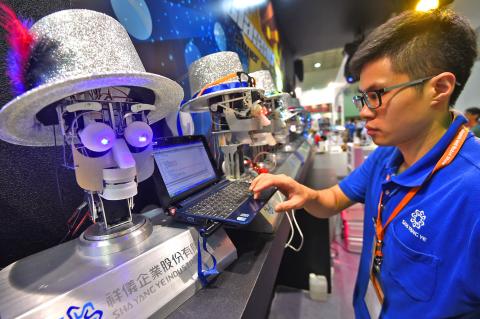The exports of Taiwan’s machine tool industry are expected to drop month-by-month this quarter, affected by falling demand in China and Europe, although the demand for Taiwanese robots is to grow this quarter, a Taiwan Automation Intelligence and Robots Association (台灣智慧自動化與機器人協會) official said yesterday.
“The export value for machine tools plunged 19.4 percent annually to US$284 million last month… We expect the size of the decline to expand further this month due to a lack of demand,” association chairman Eric Chuo (卓永財) told reporters on the sidelines of the opening ceremony of Automation Intelligence and Robots Show at the Taipei World Trade Center Nangang Exhibition Hall.
The order visibility for Taiwan’s machine tools in the final quarter of the year is unclear at the moment, he said.

Photo: Chang Chia-ming, Taipei Times
The sector’s export value dropped 9.1 percent annually to US$164.6 million in the first half of this year, according to data from the Taiwan Machine Tool & Accessory Builders’ Association (臺灣區工具機暨零組件工業同業公會).
By export destinations, Chuo, who is chairman of the nation’s leading machine tool manufacturer — Hiwin Technologies Corp (上銀) — said the demand from Europe and China was weaker than expected, and that only US orders remained robust in the past six months.
Chuo said the weakness of the yen against the US dollar also affected Taiwan’s machine tool industry, as a cheaper Japanese currency undercuts orders to Taiwanese companies, while the strength of the New Taiwan dollar also had a negative impact.
The increasing localization of supply chains and softer-than-expected economic growth in China has also affected local machine tools demand, Chuo said.
Taiwanese machine tool makers need to invest in research and development to raise their competitiveness, such as investing in industrial automation or robots to meet the rising demand in the global market, he said.
Hiwin’s consolidated sales reached NT$7.95 billion (US$253.91 million) in the first half of this year, up 21.53 percent from NT$6.55 billion a year earlier, which Chuo attributed to an increase in sales for its automation and robots segment.
Chuo said he expects the export value for Taiwan’s industrial robots to grow month-by-month this quarter.
Machine and robotic control maker Avantech-LNC Technology Co Ltd (研華寶元) has a similar outlook, saying that it expects the demand for industrial automation to be stronger in the second half of this year due to labor shortages in China.
“Industrial computers that control industrial robots will benefit from the rising demand for industrial automation,” Avantech-LNC sales representative Allen Fan (范聖明) told the Taipei Times.
The Ministry of Economic Affairs said it estimates the production value of Taiwan’s industrial automation, including industrial robots, is likely to increase 10 percent annually this year to NT$1.2 trillion.

Nissan Motor Co has agreed to sell its global headquarters in Yokohama for ¥97 billion (US$630 million) to a group sponsored by Taiwanese autoparts maker Minth Group (敏實集團), as the struggling automaker seeks to shore up its financial position. The acquisition is led by a special purchase company managed by KJR Management Ltd, a Japanese real-estate unit of private equity giant KKR & Co, people familiar with the matter said. KJR said it would act as asset manager together with Mizuho Real Estate Management Co. Nissan is undergoing a broad cost-cutting campaign by eliminating jobs and shuttering plants as it grapples

TEMPORARY TRUCE: China has made concessions to ease rare earth trade controls, among others, while Washington holds fire on a 100% tariff on all Chinese goods China is effectively suspending implementation of additional export controls on rare earth metals and terminating investigations targeting US companies in the semiconductor supply chain, the White House announced. The White House on Saturday issued a fact sheet outlining some details of the trade pact agreed to earlier in the week by US President Donald Trump and Chinese President Xi Jinping (習近平) that aimed to ease tensions between the world’s two largest economies. Under the deal, China is to issue general licenses valid for exports of rare earths, gallium, germanium, antimony and graphite “for the benefit of US end users and their suppliers

Dutch chipmaker Nexperia BV’s China unit yesterday said that it had established sufficient inventories of finished goods and works-in-progress, and that its supply chain remained secure and stable after its parent halted wafer supplies. The Dutch company suspended supplies of wafers to its Chinese assembly plant a week ago, calling it “a direct consequence of the local management’s recent failure to comply with the agreed contractual payment terms,” Reuters reported on Friday last week. Its China unit called Nexperia’s suspension “unilateral” and “extremely irresponsible,” adding that the Dutch parent’s claim about contractual payment was “misleading and highly deceptive,” according to a statement

The Chinese government has issued guidance requiring new data center projects that have received any state funds to only use domestically made artificial intelligence (AI) chips, two sources familiar with the matter told Reuters. In recent weeks, Chinese regulatory authorities have ordered such data centers that are less than 30 percent complete to remove all installed foreign chips, or cancel plans to purchase them, while projects in a more advanced stage would be decided on a case-by-case basis, the sources said. The move could represent one of China’s most aggressive steps yet to eliminate foreign technology from its critical infrastructure amid a